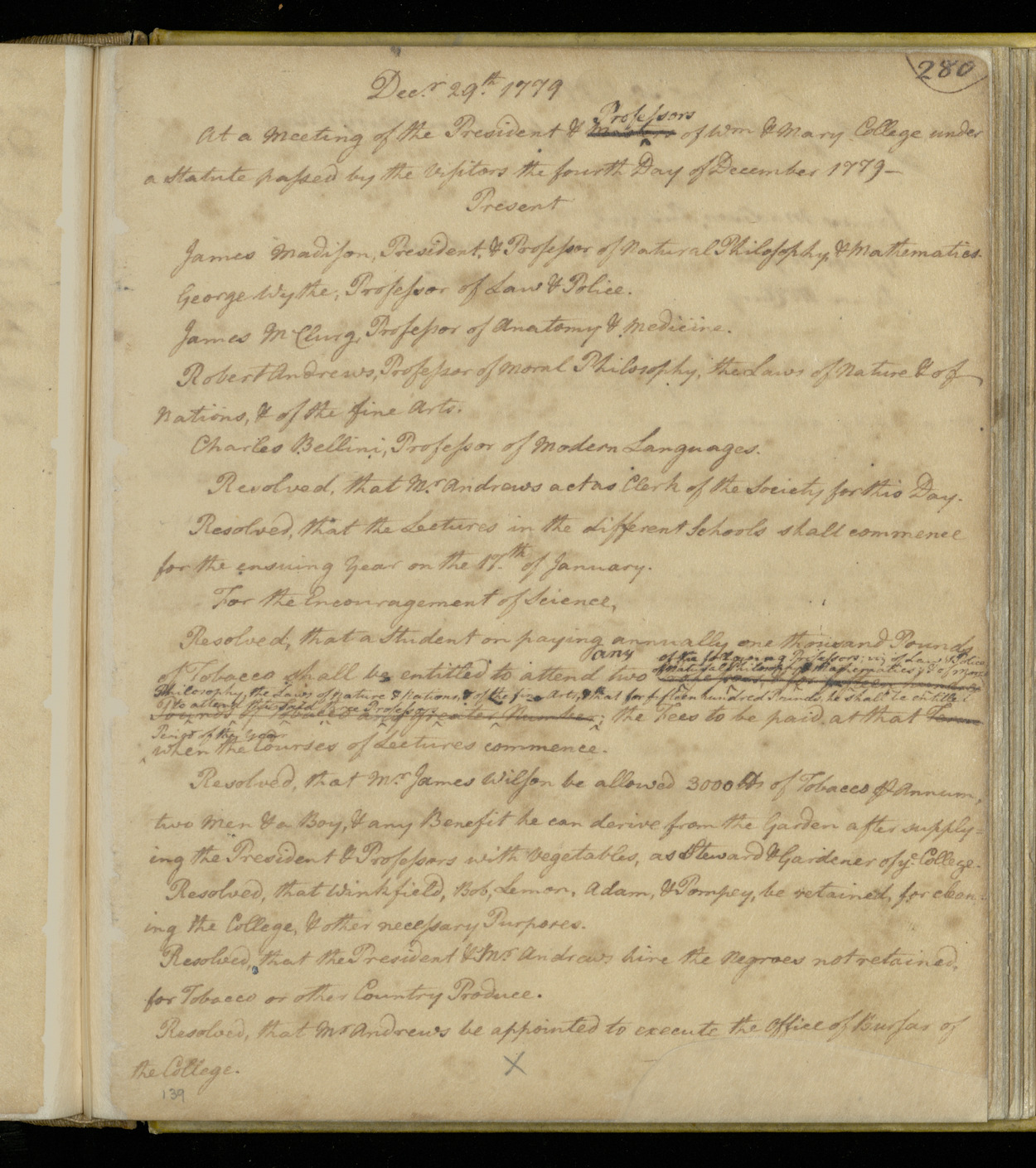Difference between revisions of "Professor of Law and Police"
m |
|||
| (12 intermediate revisions by 2 users not shown) | |||
| Line 1: | Line 1: | ||
| − | After becoming the Governor of Virginia and a member of the Board of Visitors at the College of William & Mary in 1779, Thomas Jefferson set into motion a change in legal education. | + | [[File:FacultyMinuteBookp280.jpg|right|thumb|350px|Minutes for "A Meeting of the President and Professors of William & Mary College," December 29, 1779. Faculty Minute Book, 1729–1784, Faculty Assembly Records, Special Collections Research Center, William & Mary Libraries ([https://digital.libraries.wm.edu/page-285-96 image 285]).]] |
| − | + | After becoming the Governor of Virginia and a member of the Board of Visitors at the College of William & Mary in 1779, [[Thomas Jefferson]] set into motion a change in legal education. His idea was that a formal educational program for lawyers should replace the practice of taking on legal apprentices.<ref>Paul D. Carrington, [https://scholarship.law.wm.edu/wmlr/vol31/iss3/2/ "The Revolutionary Idea of University Legal Education,"] ''William & Mary Law Review'' 31 (1990), 527.</ref> His goal was to introduce a program of study that would teach law with the aim of "inculcate[ing] republican virtue, those traits needed by public men to evoke public trust in public institutions."<ref>Paul D. Carrington, Teaching Law and Virtue at Transylvania University: The George Wythe Tradition in Antebellum Years, ''Mercer Law Review'' 41 (1989), 675.</ref> At a meeting of the College's Board of Visitors on December 4, 1779 he was able to do just that: a resolution was passed that created the Chair of Law and Police as one of the six professorships at the College.<ref>The Virginia Gazette, [https://scholarship.law.wm.edu/gwythe/2/ "At a convocation of the visitors of the college of William and Mary, on the 4th day of December 1779, a statute was passed, of which the following is an extract,"] December 18, 1779, 1.</ref> | |
| − | George Wythe, Jefferson’s teacher, was recruited to fill the [[Wythe the Teacher|position]]. | + | |
| + | [[George Wythe]], Jefferson’s teacher, was recruited to fill the [[Wythe the Teacher|position]]. Wythe lectured twice a week on topics such as the political economy, public law, and English common law and created regular moot court sessions where students argued in front of Wythe and other professors.<ref>W. Taylor Reveley, III, [https://scholarship.law.wm.edu/facpubs/75/ “W&M Law School Came First. Why Care?”] ''University of Toledo Law Review'' 35 (2003), 185.</ref> Wythe served as the Chair of Law and Police<ref>'"Police" meant civil order or administration.' Alonzo Thomas Dill, ''George Wythe: Teacher of Liberty'' (Williamsburg, Virginia: Virginia Independence Bicentennial Commission, 1979), 42.</ref> until 1789 and was succeeded by [[St. George Tucker]] who continued the focus on public affairs. Tucker, like Wythe, also served concurrently as a judge, a tradition that continued for the [https://scholarship.law.wm.edu/deans/ Chair of Law and Police at William & Mary] until 1851.<ref>Carrington, "Teaching Law and Virtue at Transylvania University: The George Wythe Tradition in Antebellum Years," 675-6.</ref> In 1861 the school would close due to the Civil War and would not re-open until 1922 as the Marshall-Wythe School of Government and Citizenship. | ||
| + | |||
| + | ==See also== | ||
| + | *[[Resignation as Professor of Law and Police]] | ||
| + | *[[Wythe the Teacher]] | ||
==References== | ==References== | ||
Revision as of 07:21, 17 September 2024

After becoming the Governor of Virginia and a member of the Board of Visitors at the College of William & Mary in 1779, Thomas Jefferson set into motion a change in legal education. His idea was that a formal educational program for lawyers should replace the practice of taking on legal apprentices.[1] His goal was to introduce a program of study that would teach law with the aim of "inculcate[ing] republican virtue, those traits needed by public men to evoke public trust in public institutions."[2] At a meeting of the College's Board of Visitors on December 4, 1779 he was able to do just that: a resolution was passed that created the Chair of Law and Police as one of the six professorships at the College.[3]
George Wythe, Jefferson’s teacher, was recruited to fill the position. Wythe lectured twice a week on topics such as the political economy, public law, and English common law and created regular moot court sessions where students argued in front of Wythe and other professors.[4] Wythe served as the Chair of Law and Police[5] until 1789 and was succeeded by St. George Tucker who continued the focus on public affairs. Tucker, like Wythe, also served concurrently as a judge, a tradition that continued for the Chair of Law and Police at William & Mary until 1851.[6] In 1861 the school would close due to the Civil War and would not re-open until 1922 as the Marshall-Wythe School of Government and Citizenship.
See also
References
- ↑ Paul D. Carrington, "The Revolutionary Idea of University Legal Education," William & Mary Law Review 31 (1990), 527.
- ↑ Paul D. Carrington, Teaching Law and Virtue at Transylvania University: The George Wythe Tradition in Antebellum Years, Mercer Law Review 41 (1989), 675.
- ↑ The Virginia Gazette, "At a convocation of the visitors of the college of William and Mary, on the 4th day of December 1779, a statute was passed, of which the following is an extract," December 18, 1779, 1.
- ↑ W. Taylor Reveley, III, “W&M Law School Came First. Why Care?” University of Toledo Law Review 35 (2003), 185.
- ↑ '"Police" meant civil order or administration.' Alonzo Thomas Dill, George Wythe: Teacher of Liberty (Williamsburg, Virginia: Virginia Independence Bicentennial Commission, 1979), 42.
- ↑ Carrington, "Teaching Law and Virtue at Transylvania University: The George Wythe Tradition in Antebellum Years," 675-6.